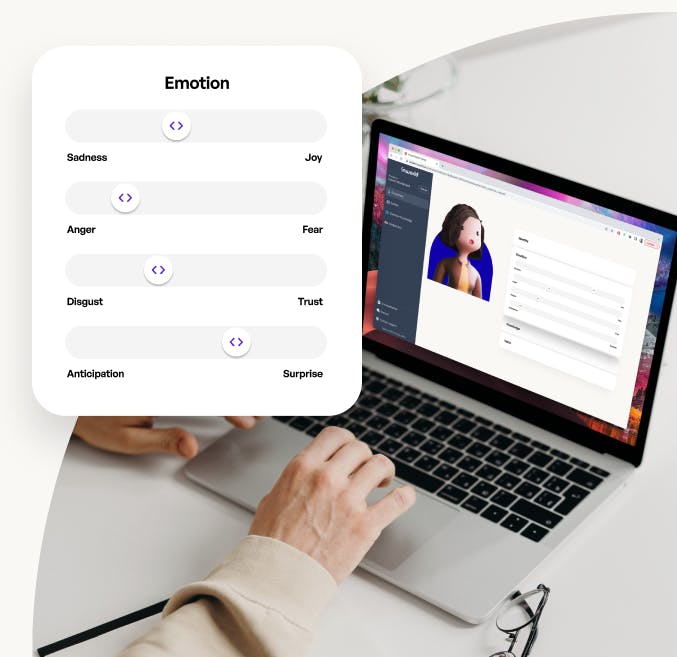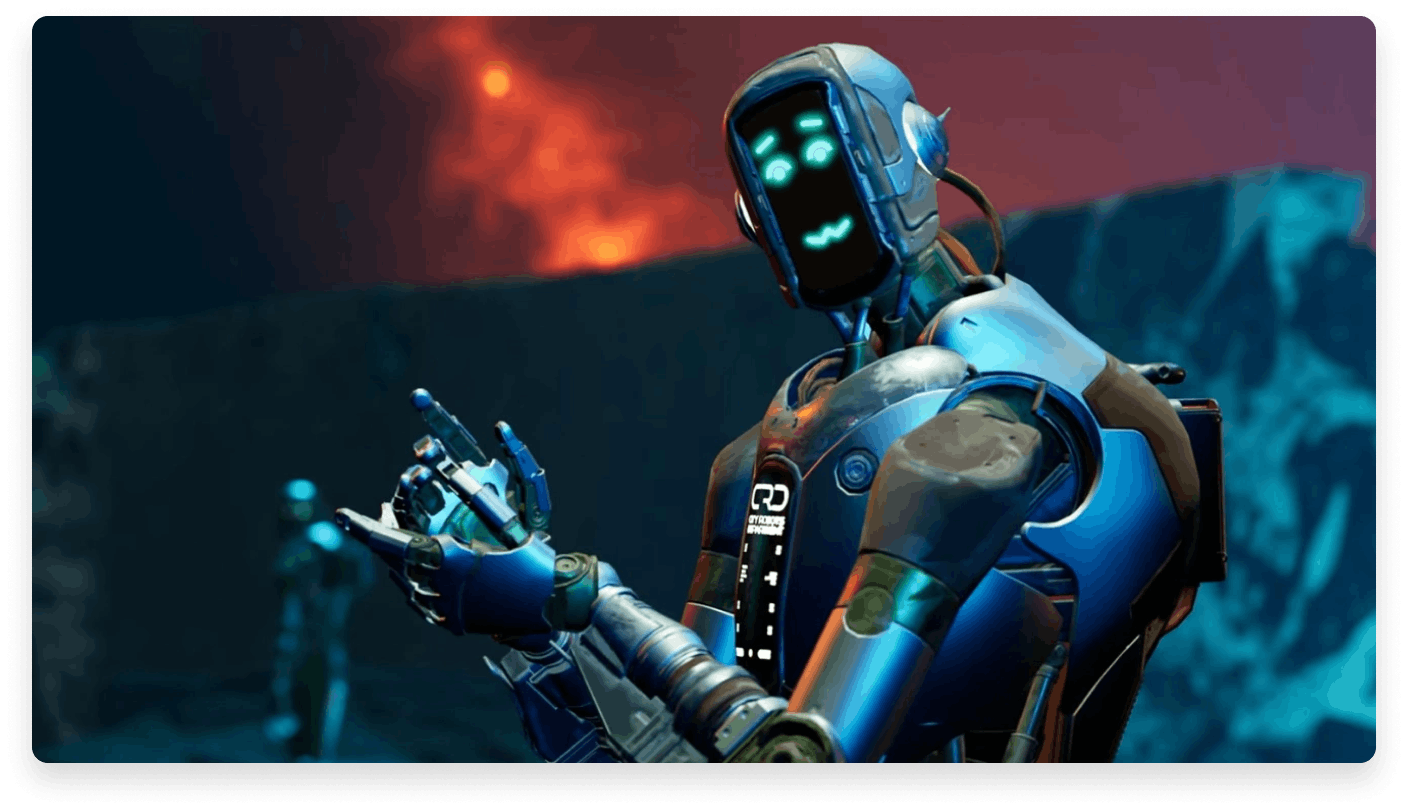Check out what's new:
How next-gen AI in video games will help game devs tell more immersive stories
AI in video games is changing the way game characters are developed. The next evolution of gaming will see game devs build engaging AI-powered characters in a matter of minutes. Unlike typical NPCs, these intelligent characters will dynamically interact with gamers.

As real-time media such as games, Metaverse, enterprise-based interactive experiences become more realistic, the amount of time needed to create prominent virtual characters who help carry the story, explain a world, or convey a message – think Atreus in God of War, Metahumans in Matrix Awakens, or a personified form of Siri – will only increase.
While engaging gameplay is key, a compelling narrative is a predictor of a title's success: NPD sales data shows that three of the top 10 games in March – Eldin Ring, Horizon: Forbidden West and Stranger of Paradise: Final Fantasy Origin – are narrative-driven. Another game from the list, MLB The Show 22, is known for its story mode. But with average development cycles in the three- to five-year range – and some games taking far longer to complete – developers may not have the time or resources to create highly interactive NPCs.
Enter natural language processing (NLP) and artificial intelligence (AI). AI in video games is changing the way game characters are developed. The next evolution of gaming will see game developers intertwine AI and video games. They'll build engaging AI-powered characters in a matter of minutes. Unlike typical NPCs, these intelligent characters will dynamically interact with gamers, participate in two-way conversations, and learn from their surroundings by mimicking the cognitive abilities and emotions of an actual person.
Imagine an Animal Crossings game where players can carry on endless conversations with Tom Nook. Or a sequel to Elden Ring where players can talk to the undead monsters and dragons they encounter. Developers are ushering in a new era of gaming that will be populated with the most compelling and interactive characters the world has ever seen. And, video game AI like Inworld, they can do so without adding weeks to their lengthy development schedules.
AI in video games: Beyond dialogue trees

While past evolutions in gaming have focused on improving the visual appearance of characters in virtual worlds, true next-gen gaming demands a paradigm shift. To create NPCs that are as human-like as possible the focus will need to shift from character visuals to character behavior. Future characters will be able to act and communicate realistically and in real time. An example: You inform Kratos, the protagonist in God of War, that he didn’t actually kill his entire family due to Ares trickery. How would you expect him to react? What if you chose to keep that information from Kratos and he later learned the truth. What would he do? Current game design parameters limit what developers can make their characters do.
Reactions like that aren’t possible unless they are programmed ahead of time for that specific NPC. Without a tool for simplifying and automating character reactions and responses, developers must create a list of all potential outcomes from scratch. This can be time-consuming and requires development resources far beyond the scope of most games, which is one reason why so many developers stick to rigid story scripts – even when they would prefer a more interactive experience.
The end result is closer to that of a movie than a truly interactive experience. Players may be able to choose how to respond to what a character says – and yield different results depending on their responses – but it’s still largely a scripted scenario with little room for dynamic growth or player-driven narrative. Characters know what they’re programmed to know, but they never really understand you or your actions.
AI video game characters give devs more options...

Interactive video game AI character models will change that. And they will do that by bringing true intelligence – an actual brain – to the video game AI characters that players encounter in every game. Developers can still write their own stories and lay out the history and personality of each character. If a developer wants to create a quirky pirate game where one of the characters wants to quit being a thief and become a paleontologist, she can do that. If another developer wants to include an NPC who pretends to be an attorney but is actually the victim of a crime that is looking to bust judges who take bribes, that can be done as well.
The difference is in how that is accomplished and what the experience is like for players. Instead of scripting the story like a screenplay, developers can leverage AI that turns their story into an interactive script, casting the audience in the storyline. They can learn and adapt to the environment – a courthouse versus a city street – and the characters within it and hide his true identity. The pirate may become indignant if the player tries to force him to give up on his dream, continue pillaging for the time being, or simply run away. It all depends on the character’s backstory and initial state.
With the right tools, developers can quickly alter an AI video game character’s mood (sadness vs. joy, anger vs. fear, trust vs. distrust) and personality (negative vs. positive, aggressive vs. peaceful, cautious vs. open). AI then takes care of the rest by allowing NPCs to respond to dramatic events with sympathy, empathy, anger, or no reaction at all depending on their mood and personality traits. This creates two-way interactions between players and NPCs that go far beyond a dialogue tree of scripted selections.
Video game AI characters will transform game play
NPCs at this level will help bring future game worlds to life. Instead of bumping into a character that simply stumbles and shouts, “Watch it!”, you may encounter one that picks a fight. AI allows the character to remember players and their habits (ex: like players who frequent that area and are always running/appear to be in a hurry or players who forged friendships with other NPCs a character doesn’t like), which creates an experience unlike any other.
AI video game characters could open several possibilities if players encounter that same character again. Maybe the character is a hothead and is ready to resume fighting, or perhaps he’s a gentler fellow who will only respond negatively after being pushed to the brink. Maybe it’s an unassuming dog walker who happens to work for the story’s main villain and has been reporting the player’s whereabouts. Now a battle ensues – one that wasn’t scripted, and that the player never expected. It was planned and it was possible but completely organic based solely on the information that was fed into the AI video game character – AI and NLP take care of the rest.
Dynamic NPCs will significantly impact overall experience, which in turn increases replay value, improves the game’s longevity, and opens up opportunities for transmedia storytelling. Anything can happen at any moment – within the constraints programmed into the game.
AI and video games are on the cusp of a revolution
Game development cycles are getting longer. That trend will only increase with the rising demand for larger and more immersive experiences. The scope of work involved in crafting those worlds is causing costs to skyrocket, which creates greater risk for publishers and studios and can lead to punishing crunch periods as teams scramble to finish games in time for their release. And, even then, in these big and beautiful, narrative-driven sagas, a lifeless, uninformed or unexciting NPC can bring the elaborately produced experience to a screeching halt by compromising the integrity of the fictional world. What developers need is a way to create characters that extend the experience through their behavior and responses. The future is AI video game characters that are as lifelike as possible –acting and communicating realistically and in real-time.
To produce a truly next-gen video game, developers must create the next generation of NPCs today, not weeks or months from now. They need tools that allow them to quickly and easily build characters whose behaviors are directly influenced by the player and also by the character’s own mood, traits, and backstory. Character creation platforms are forever changing the way game worlds are built.
The days of static, boring NPCs are history.
AI and video games have the makings for a perfect marriage. Try out Inworld's characters today to experience the future of AI in video games now.